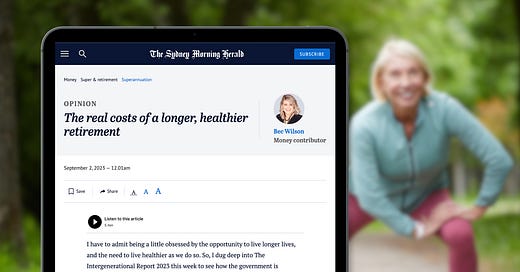The real costs of a longer, healthier retirement
I dug deep into The Intergenerational Report 2023 this week to see how the government is projecting life expectancy to change for people who make it to the age of 65 over the rest of their lifetime.
I have to admit being a little obsessed by the opportunity to live longer lives, and the need to live healthier as we do so. So, I dug deep into The Intergenerational Report 2023 this week to see how the government is projecting life expectancy to change for people who make it to the age of 65 over the rest of their lifetime.
Of course my obsession lies partly in trying to calculate how much money people really need to live out an epic retirement, and how we can better plan for, and expectation manage our goals of living a longer life.
They’re also pretty selfish. I want to live longer, and healthier for my years ahead than the generations before me.
So, what did I discover? I think the government are presenting the ‘safe’ and statistically correct picture of our ageing population, as you would expect. In fact, I believe the Intergenerational Report could be an exciting understatement for longevity in the decades ahead of us and today’s middle-agers and younger generations might live longer than the government charts can show.
And if they do, they’d want to get far more proactive about their health because you will pay if you don’t.
The good news is, our country can afford us to live longer, finally, thanks to the growth and advancement of superannuation, something we could not have said 20 years ago.
My conclusion, you should bet on living longer than the government thinks you will, and you should start looking after your health better now. Investing in your health now might just be the wisest long-term financial decision you can make.
Let me dive into why. The government statistics projected to 2062/63 in the Intergenerational report look conservative to many experienced actuaries around the country. That’s because they are based on historical statistical analysis which doesn’t factor in any rapid advancements in science or modern medicine.
I have to say, I don’t believe that we won’t see some major health breakthroughs in the next forty years.
The current life expectancy for men who reach the age of 65 is 85, and for women it is 87.7. This new edition of The Intergenerational Report projects that over the next 40 years, that number will rise by 4.7 years for men and 3.5 years for women, to predict an average life length of 89.7 for men and 91.2 for women. That’s a good increase, but in a recent report presented to the UK parliament, it was suggested that 50 per cent of people born after 1971 could live to the age of 100 if we take in advancements in science and technology in our lifetime - something historical statistics cannot do.
So what does that mean for retirement planning? It means you should look at your own family history, health practices and environment to consider whether you are likely to be one of the ‘lucky ones’.
Then decide the number of years you will budget to live for in retirement based on your own situation. You might consider trying this life span calculator built by actuaries who have considered these things deliberately in their projections.
One jarring piece of data buried deep in the report is the insight that Australian men on average spend 88 per cent of their lives in full health, while women spend around 87 per cent, meaning that today, the average Australian health span is 74.8 for men, and 76.3 for women.
Over the next 40 years, if health spans rise at a similar level, today’s middle-agers will expect to remain healthy to the age of 78.9 for men, and 79.3 for women. That would see a man live an average of 8.8 years in less favourable health, and a woman live 11.9 years.
The personal cost of this could be enormous, impacting how much we should budget for home care services and healthcare in our later lives, in a way many people have not accounted for in their retirement planning to date.
Over the decades ahead of us, home care and aged care systems are predicted to be operated on an increasingly user-pays basis, rather than with the high levels of government subsidy they now operate, and as this happens, if your body is not in good health, you will have to pay for it.
As a woman myself, the idea of spending 11.9 years in poor health is too many and motivates me to try and beat the statistics! The science of ageing is showing us a variety of ways we can try to improve our health span. But it does require each person to take more responsibility for their own exercise, diet and act in the prevention of chronic illness, perhaps more than we do on average in Australia right now.
There’s no doubt, The Intergenerational Report speaks loudly to those planning for retirement in the next 10, 20 or even 30 years: longer lives to budget for, better health spans, but still longer periods of our lives spent in ill-health that we will have to pay for care in.
Clearly that makes our health one of the best investments on offer.
This article was first published on 2nd and 3rd September 2023, in The Sydney Morning Herald, The Age, Brisbane Times and WA Today, in both print and digital. You can see the whole article here.





